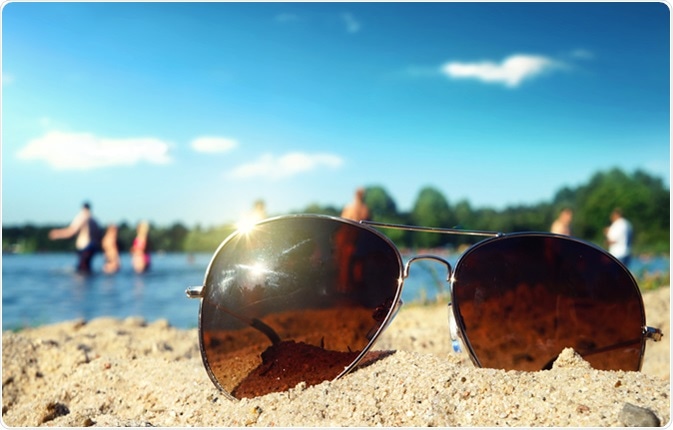A sunburn of the cornea is called photokeratosis, which is caused by overexposure to the sun’s ultraviolet B (UV-B) or ultraviolet C (UV-C) rays. Photokeratosis is also known as snow-blindness or radiation keratitis. Sunburn of the eyes can be a very painful condition, but it is reversible and resolves within a few days. The condition is very comparable to sunburn of the skin.
When the cornea is exposed to too much UV radiation, an inflammatory response is triggered, causing pinpoints of damage (punctate erosions) in the corneal epithelium.

Image Credit: Lassedesignen / Shutterstock
Signs and Symptoms
Symptoms of sunburned eyes include:
- Redness
- Pain
- Swelling of the eyelids
- Watery eyes
- Headache
- Visual changes
- Loss of vision
- Foreign body sensation
The onset of symptoms is usually 6-12 hours after exposure, but can be as little as 1 hour.
Photokeratosis has similar symptoms to eye conditions such as chemical burns of the eye, conjunctivitis, dry eye, and allergic reaction, and may sometimes be mistaken for one of those conditions.
Sunburned eyes most often occur at high altitudes or with exposure to bright fields of snow. Tanning beds, a welder’s arc, lightning, and halogen lamps can also cause photokeratosis. Sunburn to the eyes caused by a welder is called flash burn, welder’s flash, or arc eye. Photokeratosis can also occur during a solar eclipse, if one looks directly at the sun.
Photokeratosis and Public Health
Outbreaks of photokeratosis have occurred in association with damaged metal halide lamps. This type of lamp is commonly used to light school gymnasiums. The inner arc tube of the lamp emits intense ultraviolet radiation. Normally, the outer glass envelope attenuates the light, making it safe. However, the light becomes hazardous when the envelope is broken. A flying ball or other object could break the envelope of the lamp. The Food and Drug Administration (FDA) has issued recommendations for safe operation of metal halide lamps. One recommendation is that metal halide lamp bulbs that do not automatically extinguish when the envelope is broken should be replaced by self-extinguishing bulbs.
Treatment and Prevention
Photokeratosis is treated by resting the eye. The eye is usually covered with a patch and treated with antibiotic eye drops. If vision is lost, it generally returns within 18 hours, and the surface of the cornea fully regenerates in 24 to 72 hours.
Comfort measures while recovering from sunburned eyes include staying indoors, wearing sunglasses, and use of preservative-free artificial tears to moisten the eyes. Contact lenses should not be worn until the eyes return to normal.
Over-the-counter analgesics can be used for pain. A cool cloth placed over the eyes is also soothing.
Sunburned eyes can be prevented with the use of sunglasses or appropriate eye protection in the case of equipment such as tanning beds or welding apparatus. Sunglasses that have a wrap-around style frame or snow goggles provide the most protection.
Although photokeratosis resolves within days, there could be long term sequelae such as corneal neuropathy. More studies are needed to determine the risk.
References
Further Reading
Last Updated: Feb 27, 2019